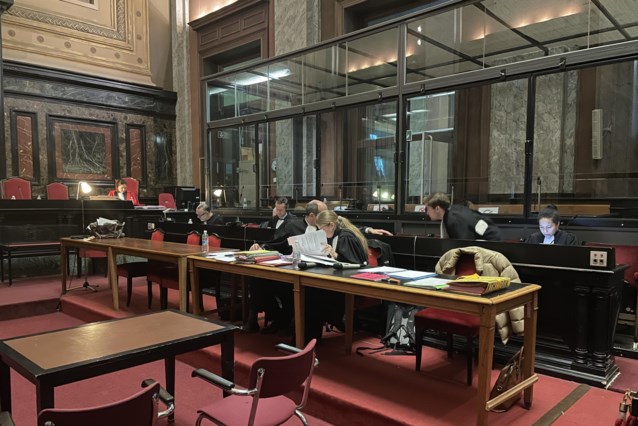Historian Paul De Ridder: ‘Brussels was once more Dutch than Ghent, Bruges and Ypres’
Discussions about the city of Brussels are probably already being held. Many other misunderstandings with all kinds of causes, pass Brussels as a Frenchified city and denounce the Belgian center. Doorbraak spoke with Paul De Ridder. As a historian, politician and, above all, a native of Brussels, he can provide a clear view of things. Why is Brussels often the center of discussion? ‘Brussels is actually to the Dutch speakers what Jerusalem means to the Jews. Yet the same “Brussels” is the stone for many Flemings…
Discussions about the city of Brussels are probably already being held. Many other misunderstandings with all kinds of causes, pass Brussels as a Frenchified city and denounce the Belgian center. Breakthrough spoke with Paul De Ridder. As a historian, politician and, above all, a native of Brussels, he can provide a clear view of things.
Why is Brussels often the center of discussion?
‘Brussels is actually to the Dutch speakers what Jerusalem means to the Jews. Yet the same “Brussels” is the stumbling block for many Flemings. The city is — to put it mildly — not very popular, but that’s actually a general phenomenon.’
‘In many countries there is quite a bit of fighting against the ‘nosy capital and its bureaucrats’. This applies not only to Brussels, but even to Berlin, Paris, London, Rome, Madrid, Moscow and Washington. In those centers of power, there are now a number of decisions that sour the life of the brave citizen. For example, not only laws and regulations are issued, but also taxes are levied. Partly for this reason there is dissatisfaction with the capital (in Flanders as well as in Wallonia).’
Concept confusion
View of Brussels from the Mont des Arts.
You told me that the term ‘Brussels’ is often used in an alternative way. What Do You Mean By That?
‘Many use ‘Brussels’ when they mean ‘government’ or ‘politics’. This confusion of concepts is actually understandable. Indeed, not only the federal and Flemish parliaments are located in Brussels, but also the Belgian and Flemish governments with interim administrative services. Even the European Parliament meets regularly in Brussels.’
‘Yet “politics” — with a few exceptions — consists of people who have nothing to do with Brussels. Those policymakers received their help from citizens who live far outside the Zennestad. They, and not the common Brussels residents, are responsible for all those laws, regulations and orders that generate as much as possible.’
‘The name Brussels is therefore used continuously ten times and many do not see it as grating at all. They are grossly mistaken, because ordinary citizens eventually come to believe that Brussels is the same as “the state”, “the government” or “Europe”. Moreover, similar populist and demagogic sloganeering contributes in no small way to Brussels’ decidedly negative image. The city bears the greatest debt for all the water that goes wrong in Flanders, in Belgium and in Europe. Yet there is of course no doubt that other factors also make Brussels unpopular, including insecurity, crime and pollution.’
From Dutch to Frenchified city
To what extent is Brussels still a Dutch city?
‘No reasonable person will dispute that Brussels is a historic Brabant and Dutch city. Anyone who takes a look at a map will see that Brussels is located north of the Dutch-French language border. Today, Brussels forms a multilingual enclave in the Dutch-speaking region. All historical place names in this city are, without a single exception, Dutch. This also applies to the name Brussels itself: it comes from “broeck” and “saal”, which means “settlement in the swamp”. There is also a Brussels in Germany, more specifically in Baden-Württenberg. In the Bundesrepublik Deutschland, however, that city is called Bruchsal. Brussels in Brabant includes districts and neighborhoods with names such as Warmoesbroeck, Ruysbroeck, Orsendael (valley of the horses, editor’s note) and Coudenberch.’
‘During the Middle Ages, the wealthy Brussels patrician families bore names such as Uten Steenweghe, Rodenbeke, Van Coudenberch and Van Ruysbroeck. Precisely those patrician families monopolized power in the Zennestad for centuries. These good burgers ruled their city in Dutch. From the end of the thirteenth century, Latin gradually made way for Dietsch, Duutsch or Duytsch in official documents. However, at the start of the 21st century, Brussels appears to be a presumably francophone city. It is therefore obvious that an evolution has continued in the loop of time ten in favor of French.’
francophone revolution
What has happened?
‘At the end of the eighteenth century, the lawyer JBC Verlooy investigated this evolution. He’s famous Discourse on the night of the maternal tael in the Netherlands (1788), on the neglect of the Dutch language and culture. As an accomplished rationalist, Verlooy goes in search of the origins of the Frenchification.’
‘In following authors from the sixteenth century, he placed the responsibility for the decline of Dutch with the dukes of Burgundy. Those French monarchs — after the extinction of the autochthonous Brabant dynasty (1406) — came to power in Brabant. They provide French as the administrative language in their central administration. In other words: since the Burgundian regime, French has been the language of communication in the heel of the Netherlands, not only of the court and nobility, but also of the central state administration. The Brabant regional institutions and the following institutions continued to use Dutch. That condition was preserved under the other monarchs who ruled over the Netherlands in the following centuries.’
‘The non-Brussels residents of the Brussels residents were responsible for the spread of French in the Netherlands, on the contrary. Foreign rulers have adopted French in Brabant. In other words: contrary to what short-viewed Flamingants will later assume, Brussels was by no means the “evil perpetrator”, but on the contrary the first and serious victim.’
Followed today
Does that evolution have consequences to this day?
‘The use of a different terminology and a simplistic slogan language ensured that Brussels gradually grew into the ideal scapegoat for all the water that went wrong in the Southern Netherlands. In addition, the aversion was increased by the fact that the central government apparatus used the French.’
‘Even today, many Flemings believe that the people of Brussels have always been “arrogant people”. They collaborated with the foreign rulers who ruled our regions: the Burgundians, the Spanish and Austrian Habsburgs, and the French Republic. According to the classic anti-Brussels prejudice, the inhabitants of Brussels would traditionally have expressed a blind astonishment for everything French and a certain aversion for everything Flemish. The decision accepted by many is therefore obvious: people from Brussels are people who cannot be trusted from a Flemish point of view. They are better off than rich.’
Frenchification
How is the Frenchification of Brussels going?
‘Especially the Flemings are convinced that they grossly overestimate the Frenchification of Brussels during the Ancien Régime. Information and training are therefore essential, based on scientific research. A great deal of work has been carried out in this area in recent years, from various disciplines. Since 1977, the language used in Brussels before 1794 has been the subject of systematic archival research. That study showed that the Brabant city of Brussels was significantly more Dutch than the Flemish cities such as Ghent, Bruges and Ypres.’
‘In 1980, a second phase of this large-scale study of language use in Brussels started. This very extensive research of sources has provided a well-founded opinion about forms of language use in Brussels during the Ancien Régime. In summary, one can say that Brussels is a Brabant and Dutch city where, especially since the sixteenth century, a French-speaking court and central state administration reside. However, this is by no means typical for Brussels. The following French-speaking minority has emerged in many cities in Europe: from London to Berlin and from Rome to Saint Petersburg. A limited francophone upper class also lived in Brussels. They had mainly withdrawn to the aristocratic neighborhood around the Koudenberg and the Sablon. Yet in 1788 about 95 percent of the population of Brussels was still Dutch-speaking.’
Language Sensitivity

Philip van Cleves.
Were the inhabitants of Brussels satisfied with the arrival of French?
‘As early as the end of the fifteenth century, men in Brussels found clear traces of a certain sensitivity to language. The Burgundian chronicler Jean Molinet relates how in 1488 Philip van Cleves came to the aid of the inhabitants of Brussels in their fight against the Habsburg Maximilian of Austria.’
‘However, Philip van Kleef’s force also included a number of Walloon mercenaries. Nevertheless, the lord of Cleves was greeted with joy in Brussels. Dated deeply injured Jean Molinet. Because, according to the chronicler, during the past wars, the Brussels’ steeds had hated the French. A few years later, during the sixteenth century, the inhabitants of Brussels once again vented enough about the “rotten Walloons”. In his diary (1549-1602) Jan De Potter from Brussels denounces the Duke of Alva.’
‘During the seventeenth and eighteenth centuries, the inhabitants of Brussels also expressed their dissatisfaction with everything French on several occasions. The imperialist wars that France lost against the Netherlands at that time were certainly not of a nature to arouse sympathy among the inhabitants of Brussels for France and its inhabitants. Especially during the last quarter of the seventeenth century, Brussels and the surrounding area suffered greatly from the violence of war. The tragic result was the bombardment of Brussels in 1695.’
Later on, the inhabitants of Brussels also described various forms of resistance, but that is for another time.




